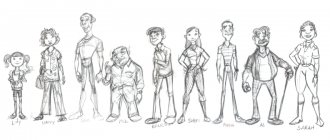Accentuation of character (or accentuation) is an actively used concept in scientific psychology. What is this mysterious phrase and how did it appear in our lives?
The concept of character was introduced by Theophrastus (a friend of Aristotle) - translated as “trait”, “sign”, “imprint”. Accentuation, accent - stress (translated from Latin)
First, it’s worth understanding the concept of character. On scientific resources one can find its definition as a set of personality traits that are stable and determine a person’s behavior, his relationships with others, habits and, as a result, his future life.
Accentuation of character is an excessive strengthening of a certain personality trait that determines the specificity of a person’s response to the events of his life..
Accentuation is on the verge of normality and pathology - if there is excessive pressure or impact on the accentuated feature, it can take on “inflated” forms. However, in psychology, accentuations are not classified as personality pathologies; the difference is that, despite the difficulties of building relationships with others, they are capable of self-control.
Accentuations of Lichko's character
Each person has stable personality characteristics, temperament, demeanor, style of communication with others and reactions to various circumstances. All these traits can be called in one word - character. It is he who gives the individual distinctive properties and makes him an individual.
Not all character traits are positive. Some cause a lot of difficulties in the life of their owner. These features, as a rule, are congenital, and in the process of socialization they can undergo changes. Maybe the subject will be able to suppress them altogether in everyday life. But in a critical situation, negative qualities can manifest themselves very clearly.
Accentuation of character is the excessive expression of its individual properties. This personality trait affects behavior and actions, attitude towards oneself and others. This is an extreme variant of the norm, which is not considered a mental disorder. Among young people, obvious or hidden accentuations are found in 95% of those examined. Growing up, a person smoothes out undesirable features, and the number of accentuations decreases to 50-60%.
Excessive expression of certain characteristics is not always harmful. For example, people with a hysterical type are talented actors, and those with a hyperthymic type are positive, sociable and can find a common language with any person.
Pedantic type
These people try to think through all possible options for action and behavior, so they cannot make an exact decision for a long time. Before doing something, they want to be completely sure that this is the best way out of a problem situation. Pedants take everything in life seriously , this can be both work issues and everyday issues. People around them may perceive this character trait with dissatisfaction and consider them boring and boring. They are distinguished by excellent perseverance ; they always bring what they plan to completion . People of the pedantic type are not ready for radical changes in their lives; they have difficulty surviving traumatic events, which can make them indecisive. They do not like to participate in conflicts and try by all means to avoid them.
Hyperthymic and cycloid
The hyperthymic type is characteristic of people who are poor strategists, but brilliant tacticians. They are enterprising, resourceful, active, and easily navigate changing circumstances. Due to this, they can significantly improve their social and professional position and move up the career ladder. But at a certain moment they tend to lose their position due to their inability to calculate certain actions in advance; they often make mistakes in people.
People with the hyperthymic type are sociable, active, enterprising, they are always in a good mood, at least in public. Children are restless, active, often play around and play pranks. Teenagers study unstably and have poor discipline. Because of this, conflicts arise with representatives of the older generation. They always have a lot of superficial hobbies, none of which really interests them. In life, they constantly overestimate their capabilities.
Cycloid accentuation is characteristic of apathetic and irritable people. As children, they constantly want to be left alone and do not like to play with their peers. They take any troubles very hard, and in response to any comments they become very irritated, even if they are the most harmless. Adolescents with cycloid accentuation experience dramatic mood changes.
In adulthood, the sharpest edges are smoothed out, but some can get stuck on their complexes, turning into melancholic and depressed individuals. Often their mood depends on the time of year.
Excitable type
They are characterized by increased impulsiveness , low control of their own desires and inclinations, which are often led. Uncontrollable during violent emotional reactions .
Instinctiveness is characteristic : they do not take into account the voice of reason and sanity, they are subject to momentary desires and desires, without thinking about the consequences.
They often show irritability and intolerance towards their surroundings and cannot tolerate criticism . To people with this accentuation, study and work seem neither fun nor attractive. They usually do not set long-term and difficult-to-achieve goals and live in the present . It is difficult for them to get along in a team due to frequent conflicts. During them, they may show inappropriate emotional reactions, react violently and spend a long time sorting things out.
Sensitive, schizoid and hysterical types
Representatives of the sensitive type are characterized by high sensitivity to any events, both frightening and joyful. Teenagers avoid active and active games and do not like large companies and pranks. They are shy and timid with strangers and give the impression of withdrawn people. At the same time, they become loyal and good comrades for those truly close to them. They do not like to communicate with peers, preferring people much older or younger than themselves. They treat their parents with love, they are afraid to upset them, so they are always obedient.
All this leads to the likelihood of developing an inferiority complex; it is difficult for them to adapt to a new team. They place inflated moral demands on themselves and others. They treat complex activities with reverence and are very responsible.
Adolescents of the schizoid type prefer loneliness to communication with peers, or, in extreme cases, the company of older people. They are not interested in communicating with other people, remaining demonstratively indifferent to it. They often do not understand their experiences and feelings, and do not show sincere sympathy for others. They also hide their own emotions; as a rule, they lack mutual understanding with their peers, which is why they treat them with hostility.
Representatives of the hysterical type love to have all attention paid to them; they are artistic and demonstrative by nature. When someone else is praised in their presence, they strive to occupy an exceptional position, attract everyone’s attention, and influence others as much as possible
They often become organizers of some projects and events. At the same time, their organizational skills are extremely undeveloped; it is difficult for them to gain authority among their peers and become their informal leaders, although they constantly want this.
Demonstrative type
A characteristic feature of this accentuation is demonstrative behavior , emotional liveliness, and artistry . Such people have a craving for fantasizing , lying and pretense, usually this is not due to the presence of malicious intent, they like to embellish their own personality in the eyes of others. They strive to be the center of attention and love praise and attention . This type of accentuation is characterized by rapid adaptation to new conditions and emotional mobility. They are inconsistent in their actions, one day they will confirm and agree with your point of view, and on the next they will completely sincerely say the opposite opinion.
Hyperthymic character
Character accentuations according to Leonhard also include the “hyperthymic” type. A hyperthymic person is always inspired. Brilliant ideas and Napoleonic plans are born in his head every five minutes. He loves to tell all his acquaintances about them, and these stories inspire him even more, but he rarely fulfills his promises for one simple reason: firstly, a hyperthymic person, like Julius Caesar, loves to do 10 things at the same time, and secondly, it’s fast for him His activities become boring, and he again looks for a new niche for activity. Nevertheless, it is interesting to be with such a person; due to his broad interests in life, he is able to carry on a conversation on any topic and give worthwhile advice completely free of charge or offer an interesting way out of a crisis situation.
Shmishek's technique
Hans Schmishek's method suggests taking a questionnaire to determine the type of accentuation. The test taker needs to answer 97 statements. There are only two possible answers: “Yes” and “No” (regarding how true the statement is in relation to the subject). You need to answer quickly, without delay, that is, the first thing that comes to mind.
The questions are divided into groups (types of accentuations), but in the questionnaire they are scattered. The result is assessed according to the table (it describes which questions correspond to which type). Some statements are similar, but this is necessary in order to comprehensively cover the type. Sometimes a person is not confident in himself or is afraid to take the test. For this purpose, the key has a special “Lie” scale. If it shows an unacceptable value (more than 5), it means the subject wanted to hide his true face or was confused in his own self-perception.
Accentuations of character and degree of their expression
The psychiatrist noted two degrees of manifestation of a person’s accentuated characteristic traits - obvious and hidden.
An obvious degree is a state when the accentuated character traits of a person have excellent expression and can manifest themselves throughout life. Moreover, such traits are mostly well compensated even in the absence of mental trauma. In adolescents, maladjustment is sometimes observed.
But with a latent degree, they most often appear after one or another mental trauma or during one or another stressful situation. Accented traits mostly do not disrupt adaptation, but sometimes short-term maladjustment is observed.
Andrey Lichko
In Russian psychology, the typology of character according to A. E. Lichko is very popular. This is a domestic psychiatrist, Doctor of Medical Sciences. He was born in the Leningrad region in 1926. Graduate of the Leningrad Pavlov Medical Institute. His research interests included the treatment and diagnosis of mental disorders in adolescence.
He created his own typology of personalities, relying on the work of Leonhard and his compatriot Pyotr Borisovich Gannushkin. His monograph “Psychopathy and Character Accentuations in Adolescents,” which was published in 1977, was popular. In fact, it still remains a reference book for domestic psychologists and psychiatrists.
He paid great attention to the popularization of science. He was the executive secretary on the editorial board of the Journal of Evolutionary Physiology and Biochemistry, edited the Review of Psychiatry and Medical Psychology named after
V. M. Bekhterev."
German psychiatrist classification
Leonhard determined types of character in psychology by assessing a person’s communication style with the people around him. At the same time, he developed and presented independent types of characters.
- Hyperthymic type. Such people are distinguished by their talkativeness, extreme contact, expressiveness of facial expressions and gestures. A person may regularly deviate from the original topic of conversation in communication; he may constantly have occasional conflicts with people around him due to the fact that he is too frivolous about family and work responsibilities. As a rule, such people themselves become initiators of conflicts. At the same time, they have many positive features that attract partners for communication. This is a thirst for activity, energy, initiative, optimism. Repulsive traits include a tendency to immoral acts, frivolity, and increased irritability.
- Dysthymic type. The person is taciturn, uncommunicative, pessimistic about the surrounding reality, and leads the most secluded lifestyle. At the same time, he values his friends highly and is ready to obey them.
- Cycloid type. He is characterized by regular mood swings, which changes the way he communicates with people around him.
- Excitable type. Such a person is characterized by low contact in communication, slow nonverbal and verbal reactions. Such people are prone to abuse and rudeness, are gloomy and boring, and constantly provoke conflicts.
- Stuck type. These are moderately sociable people, prone to moralizing, and very taciturn. In any business they strive to achieve maximum performance and place increased demands on themselves. Vulnerable and touchy, sensitive to social justice.
- Pedantic type. They practically do not enter into conflicts and generally behave passively. At work they make many claims and demands on others, and behave like bureaucrats.
- Anxious type. People from this group are characterized by timidity and low communication skills. They are predominantly in a depressed mood and feel insecure. They rarely enter into conflicts with others and play an extremely passive role in them.
- Emotive type. Such people prefer to communicate exclusively among a select few. They carry grievances deep within themselves. People around them are attracted by compassion, kindness, and have a heightened sense of duty. At the same time, they are very tearful and sensitive.
- Demonstrative type. These people easily establish contacts with complete strangers, love to be praised, and strive for leadership and power. Demonstrating high adaptability, they are prone to intrigue. At the same time, they irritate those around them with their own self-confidence, boasting, and hypocrisy. They are attracted by their exceptional artistry, courtesy, extraordinary actions and thinking, and are able to captivate others with some idea.
- Exalted type. Amorous and talkative people. They argue constantly, but rarely lead to conflict. They are attentive to friends, altruistic, ready to sympathize and show sincerity. They are repelled by susceptibility to momentary moods and alarmism.
- Extroverted type. These are contact people with a lot of friends and acquaintances. They always have many acquaintances and close friends, they are open to communication and any information. They attract others with their diligence and willingness to listen to another person. Many do not like him because of their frivolity, passion for entertainment, rash actions, and regularly participate in the spread of rumors.
- Introverted type. These are closed people, divorced from reality. They love to be alone. They have strong beliefs about life around them and strict principles. At the same time, they are ready to persistently defend their ideals, even if they are fundamentally wrong and stubborn.
It is worth emphasizing that this classification applies mainly to adults.
Classification according to Leonard
The concept of “character accentuation” was first introduced by the German scientist Karl Leonhard, who subsequently proposed the first classification of accentuations in the middle of the last century.
Leonhard's typology includes 10 accentuations, which were subsequently divided into 3 groups; their difference is that they relate to different manifestations of personality:
- temperament
- character
- personal level
Each of these groups includes several types of accentuations:
- Temperament accentuations:
Leonhard’s classification of temperament accentuations includes 6 types:
Table 1: Leonhard classification
| Hyperthymic | The hyperthymic type is sociable, loves to be among people, and easily makes new contacts. He has pronounced gestures, lively facial expressions, and loud speech. Labile, prone to mood swings, therefore often does not fulfill his promises. Optimistic, active, proactive. Strives for something new, needs vivid experiences, varied professional activities. |
| Dysthymic | Taciturn, stays away from noisy companies. Overly serious, unsmiling, distrustful. He is critical of himself, which is why such people often suffer from low self-esteem. Pessimistic. Pedantic. The dysthymic personality is reliable in close relationships, morality is not an empty word. If they make promises, they strive to fulfill them. |
| Affectively labile (cycloid) | People have moods that change several times a day. Periods of active activity are replaced by complete powerlessness. The affect-labile type is a person of “extremes”; for him there is only black and white. The manner of relationships with others depends on the mood - behavioral transformations are frequent - yesterday he was affectionate and kind to you, but today you cause him irritation. |
| Affectively exalted | They are emotional, and the emotions they experience manifest themselves clearly and sincerely. Impressionable, amorous, quickly inspired. These people are creative, among them there are many poets, artists, and actors. They can be difficult to interact with, as they tend to exaggerate and make mountains out of molehills. In a difficult situation they are prone to panic. |
| Anxious | The anxious type of accentuation is not self-confident, difficult to make contact, and shy. Shy, which clearly manifests itself in childhood - children with such accentuation are afraid of the dark, loneliness, sharp sounds, and strangers. He is suspicious, often sees danger where there is none, and experiences failures for a long time. Examples of positive aspects of the anxious type are responsibility, diligence, and goodwill. |
| Emotive | The accentuated personality of the emotive type is similar to the exalted type in the depth of the emotions experienced - they are sensitive and impressionable. Their main difference is that the emotive type finds it difficult to express emotions; he accumulates them in himself for a long time, which leads to hysteria and tears. They are sympathetic, compassionate, and willingly help helpless people and animals. Any cruelty can plunge them into the abyss of depression and grief for a long time. |
- Description of character accentuations:
| Demonstrative | Artistic, lively, emotional. They strive to impress others, but do not disdain pretense and even outright lies. The demonstrative type believes in what he says. Even if he realizes his lies, there is no reason to feel remorse, since he tends to repress any kind of unpleasant memories from his memory. They love to be the center of attention, are influenced by flattery, and it is important for them to take into account his merits. They are fickle and rarely keep their word. |
| Pedantic | Accented personalities of the pedantic type are slow and carefully think about it before making a decision. They strive for orderly professional activities, are diligent and see things through to the end. Any type of change is perceived painfully, transformations for new tasks are difficult to achieve. They do not have conflicts and calmly give up leading positions in a professional environment. |
| Stuck | The stuck type retains emotional experiences in memory for a long time, which characterizes behavior and perception of life; they seem to be “stuck” in a certain state. Most often it is wounded pride. They are vindictive, suspicious, not trusting. In personal relationships they are jealous and demanding. They are ambitious and persistent in achieving their goals, which is why accentuated personalities of the stuck type are successful in professional life. |
| Excitable | The excitable type, in moments of emotional arousal, has difficulty controlling desires, is prone to conflicts, and is aggressive. Reasonableness retreats, unable to analyze the consequences of its behavior. Accented personalities of the excitable type live in the present and do not know how to build long-term relationships. |
- Description of personal level accentuations:
The classification of accentuations at the personal level is familiar to everyone. The concepts of extrovert and introvert often used in everyday life are described in pronounced forms in the table below
| Extroverted | Open, sociable, loves to be among people, does not tolerate loneliness. Non-conflict. Planning your activities is difficult, frivolous, demonstrative. |
| Introverted | The concept of “introverted person” means that he is silent, reluctant to communicate, and prefers loneliness. Represses emotions, withdrawn. Stubborn, principled. Socialization is difficult. |
Conformal, psychasthenic and paranoid types
Minors of the conformist type do not have their own opinions, they are not critical of themselves, and lack initiative. They are very easy to subordinate to some authority or group of people. The life attitude of most of them in any situation can be characterized by the words “be like everyone else.” At the same time, they are very conservative and prone to moralizing. To protect their interests, they are even ready to commit very unseemly acts, for which they find explanation and justification.
Adolescents of the psychasthenic type are prone to deep introspection, reflection, and assessment of the behavior of the people around them. In terms of their intellectual development, they are ahead of their peers; their indecision is combined with peremptory views and judgments, and self-confidence. When they need attentiveness and discretion, they are often prone to impulsive actions. With age, representatives of the psychasthenic type experience little change. This often ends in drug or alcohol use. In relationships, they are petty and despotic, this prevents them from normal communication with people around them.
It is interesting that the paranoid type is not always included in Lichko’s classification. The fact is that its main manifestations appear only after 30, or even 40 years. In adolescence and especially childhood, its representatives are usually classified as schizoid or epileptoid accentuation. In adulthood, inflated self-esteem and the idea of one’s own exclusivity begin to come to the fore. They differ from delusional ideas only in that others perceive them as quite real, albeit unreasonably exaggerated.
Anxious type
They are subject to anxiety and fears for various reasons. Unsure of thoughts and decisions. They sense danger around them and are worried for no particular reason. For a long time they tend to experience failures, are afraid of making a mistake and choosing the wrong decision, and are indecisive. During a dispute, they can hardly defend their positions; it is easier for them to silently agree with someone else’s point of view.
They are distinguished by commitment and diligence , they are characterized by a high level of responsibility and self-criticism .
Very often they cannot withstand external conditions and feel exhausted and cannot withstand stress factors. They feel insecure being the center of attention when speaking in front of an audience. They do not start conflicts and try to avoid them.
Unstable, emotionally labile and epileptoid types
Teenagers with unstable personality types constantly gravitate towards idleness and entertainment. They have no life goals and interests in life; they care little about the future. In most cases, those around them characterize them as people going with the flow.
Children with an emotionally labile personality type are characterized by strong and regular mood swings, and their behavior is unpredictable for others. It is noteworthy that any little things can become the reason for such mood changes. For example, an unfriendly phrase or a sidelong glance. When they are in a bad mood, adolescents with an emotionally labile personality type feel the need for support from loved ones. They feel well how others treat them.
At an early age, representatives of the epileptoid type are very tearful. But when they grow up, they themselves begin to offend the little ones, preferring to mock those who are not able to fight back. They are characterized by cruelty, power and pride. In the society of other children, they strive not just to become leaders, but real rulers. In groups that take control, they establish the most rigid, sometimes even autocratic, orders. They are able to please management and often occupy influential positions due to this.
Dysthymic type
Representatives of this type of accentuation look too serious , they are often characterized by a depressed mood . Constant negative experiences, lack of joyful feelings, anticipation of troubles limit their activity. They are characterized by a solitary lifestyle , they feel out of place in a large company, and they have few friends. They feel relaxed only in small companies with people they trust. They urgently need acceptance and understanding , love and friendship. They tend to fall into a depressed state; positive and joyful events change their mood only for a short period of time. They are often haunted by an unreasonable feeling of guilt , the future seems gloomy and foggy.
Always ready to help, reliable, conscientious . These are people you can rely on and not be afraid that secrets will be discussed.
They do the work at a slow pace , but efficiently and scrupulously.
Personality accentuation theories
The first theory of character accentuations was developed by Karl Leogard, it became incredibly useful and most closely matched the definition of a person’s character. But its use was limited by the fact that only adults could answer the questions. Since a child or teenager, due to lack of the necessary experience, cannot answer them, it is extremely difficult to determine their accentuation.
The domestic psychiatrist Andrei Lichko began to solve the problem. He was able to modify the Leogard test to determine the character of a person regardless of his age. In addition, Lichko somewhat reworked the characteristics of the types of accentuations, renamed some of them and introduced several new types.
Lichko believed that it is very important to study character accentuations in adolescents, since they are formed in childhood and at this age they manifest themselves especially clearly. The specialist expanded the characteristics of certain accentuations due to certain manifestations in childhood and adolescence, as well as how they change with age
The psychiatrist devoted such works to this as:
- "Teenage drug addiction";
- "Adolescent Psychiatry";
- “Psychopathy and character accentuations in adolescents.”
Emotive type
They are distinguished by increased sensuality , they are characterized by deep sensory experiences and increased emotionality. Unlike exalted individuals, they do not express their feelings externally, but accumulate them. They experience deep feelings from various life experiences , both positive and negative. They avoid conflict situations and are not prone to showdowns. They try to contain within themselves , but they do not always succeed, they are whiny and sensitive . They are characterized by responsiveness and empathy , not only for close people, but also for fictional characters in literature and films. The rudeness of others provokes stress and can lead to emotional turmoil.
Accentuation of personality character in dynamics
Psychological science has not yet thoroughly studied the problems associated with the development or dynamics of character accentuations. Andrey Lichko made the most significant contribution to the study of this problem and noted the following phenomena in the development of accentuations:
- they are formed and sharpened to one degree or another during puberty, then they are smoothed out or compensated, obvious accentuations can change and become hidden;
- against the background of hidden accentuations, the traits of a particular type of character are revealed under traumatic circumstances;
- with one or another accentuation, certain disorders or disturbances may appear in the form of neuroses, acute effective reactions or deviant behavior;
- one or another type of them can be transformed under the influence of the environment or mechanisms that were laid down by the human constitution;
- acquired psychopathy is formed.
Personality accentuation
The author of the typology of character accentuations was the first to propose using this term in official scientific literature. With it he replaced the previously existing concept of personality accentuation. The main motive for this was that a person’s personal characteristics cannot be generalized by this concept, since they are much broader and also include worldview, education, perception characteristics, and reaction to external stimuli.
In psychology, character accentuation is temporary changes in an individual’s character that can disappear or radically change during the development and growth of the child. The fact is that character is an external reflection of the type of our nervous system and becomes a specific characteristic of the characteristics of human behavior. The changes that occur in a teenager can last a lifetime or develop into psychopathy. In this case, the path of accentuation is determined by its severity, type and social environment.
As a result, this definition was finally entrenched in psychology. Accentuation of character is a concept that has determined the development of characterology for many years.
At the same time, Lichko, like Leonhard, considered accentuation to be only one of the variants of character deformation, in which its individual traits acquire additional expression. All this increases the sensitivity of the individual to some types of influences, making it difficult to adapt in other cases. As a result, a person develops the ability to adapt at a fairly high level. At the same time, accentuated individuals cope much more successfully with certain types of influences that do not touch the place of least resistance.
Lichko imagined accentuation itself as a kind of borderline state between psychopathy and the norm. In this regard, the classification itself is largely based on the typology of psychopathy that existed at that time. In total, Soviet scientists identified eleven varieties.
Which personality types suit each other?
When becoming familiar with accentuations, most people are interested in the question of the ability to effectively interact with other psychotypes. We can talk about psychological compatibility when partners have similar positive qualities, which in most cases are the result of upbringing:
- responsibility;
- seriousness;
- goodwill;
- the ability to empathize.
If you need to figure out which personality types fit together, or whether a particular person is right for you, find out their positive characteristics first.
Incompatible partners, as a rule, have similar negative character traits: laziness, selfishness, irresponsibility, etc.










